- Home
- Paula McLain
The Paris Wife: A Novel Page 33
The Paris Wife: A Novel Read online
Page 33
umby and I returned to Paris after our summer in Carmel. He missed his father terribly and, honestly, I didn’t know where else I should go.
After a few months there, I became involved with Paul Mowrer, an old journalist acquaintance of Ernest’s. Paul was the foreign editor of the Chicago Daily News and a good poet in private as well. He and Ernest had worked together in Lausanne, and I’d met him a few times back then. Not long after Ernest and I separated, I ran into Paul at a tennis club and he invited me out after my game, for a beer at the Café de l’Observatoire. He was interested in me, and made that gently clear, but I needed time to think. So much of me still belonged to Ernest, I wasn’t sure I could ever really love anyone else. But Paul was incredibly kind and patient, too, and he had these wonderfully clear Mediterranean-blue eyes. The longer I looked into them, the longer I wanted to go on looking into them. There was nothing complicated about Paul. He was solid and even and had that wonderful stillness all the time. I knew he would love me forever and not ruin me, not even a little. I just had to let it happen.
In the spring of 1928, Ernest and Pauline left Paris for the States. Pauline was five months pregnant at the time, and they were headed to Piggott and then to Key West, where Dos Passos had promised the best tarpon fishing in the world. Pauline would buy a house for them and make everything wonderful because she knew how to do all of that—where to buy the best furniture and how to get pictures framed the right way and which friends to cultivate. She could care for him better than I had, maybe. Or maybe not.
In the end, Ernest didn’t have the luck I did in love. He had two more sons, both with Pauline, and then left her for another. And left that one for another, too. He had four wives altogether and many lovers as well. It was sometimes painful for me to think that to those who followed his life with interest, I was just the early wife, the Paris wife. But that was probably vanity, wanting to stand out in a long line of women. In truth it didn’t matter what others saw. We knew what we had and what it meant, and though so much had happened since for both of us, there was nothing like those years in Paris, after the war. Life was painfully pure and simple and good, and I believe Ernest was his best self then. I got the very best of him. We got the best of each other.
After he left for the States, I saw him just twice more in my very long life, but I watched from a distance as he became, very quickly, the most important writer of his generation and also a kind of hero of his own making. I saw him on the cover of Life magazine and heard about the wars he covered bravely and the other feats—the world-class fishing, the big-game hunting in Africa, the drinking enough to embalm a man twice his size. The myth he was creating out of his own life was big enough to take it for a time—but under this, I knew he was still lost. That he slept with the light on or couldn’t sleep at all, that he feared death so much he sought it out wherever and however he could. He was such an enigma, really—fine and strong and weak and cruel. An incomparable friend and a son of a bitch. In the end, there wasn’t one thing about him that was truer than the rest. It was all true.
The last time we ever spoke was in May of 1961. He called out of the blue around lunchtime on a cool afternoon when Paul and I were in Arizona, vacationing at a ranch we returned to every few years for the fine fishing and the views. I took the call alone while Paul invented an errand because he knew I needed this. I didn’t have to ask. We’d been married thirty-five years, and Paul knew me better than anyone. Almost.
“Hello, Tatie,” Ernest said when I picked up the receiver.
“Hello, Tatie,” I said back, smiling to hear our forty-year-old nickname again.
“Your housekeeper told me how to find you. I hope you don’t mind.”
“No, I’m happy you called. I’m happy it’s you.”
I told him quickly about the ranch Paul and I were staying at, because I knew he would approve of it. It wasn’t prissy or too comfortable. In the cabin, there were dark silky places on the wood paneling from eighty years of good fires, and all the furniture was rugged and plain and felt real under you. The days were long and open. The nights were full of stars.
It had been ages since I’d heard from him, and now he was calling to talk about a new book, a memoir. He wanted to share stories about our time in Paris.
“Do you remember the whores at the bal musette, and the accordion music and the smoke and the smells?”
I told him I did.
“Do you remember that Bastille Day when musicians played under our windows for nights on end?”
“I remember it all.”
“You’re everywhere in the book,” he said, and his voice dipped. He was working hard to stay cheerful, but I knew he was sad and low and haunted. “It’s been something, writing that time and living it all again. Tell me, do you think we wanted too much from each other?”
“Oh, I don’t know, Tatie. It’s possible.”
“Maybe that’s it. We were too hooked into each other. We loved each other too much.”
“Can you love someone too much?”
He was quiet for a moment and I could hear static coming through the line, a low crackle that seemed to stand for every sharp thing that had come between us. “No,” he finally said, his voice very soft and sober. “That’s not it at all. I ruined it.”
I felt a hot clench in the muscles of my throat, but I tried to rally. We both did. We talked about Paris a while longer and then talked about Bumby and his new wife, Puck, and then stayed on the phone though everything had been said.
“Take care of the cat,” he said when he rang off, meaning me. I hung up and sat down hard on the sofa and then surprised myself by bursting into tears.
Later that afternoon, Paul and I took the long way to the stream and dropped our lines in just as the insects began to swarm and the light began to change. It was our favorite part of the day, this in-between time, and it always seemed to last longer than it should—a magic and lavender space unpinned from the hours around it, between worlds. I held my reel and felt the line list, and was back in Cologne with Ernest and Chink. Back at my first fish, knowing there wouldn’t be any fish without this one, and no love without this first one either.
It was a Sunday in July when we got the call from Ernest’s wife, Mary, that he had shot himself. He’d woken early and put on his favorite red robe and gone into the front foyer with one of his most loved guns. He’d stood in a pool of light and leaned into the barrel and tripped both triggers.
The irony wasn’t lost on me that this is exactly the way my father had killed himself, and Ernest’s father, too, in 1928, when Ernest was just twenty-nine. Maybe it wasn’t irony at all, but the purest and saddest sort of history. Ernest’s father used a Civil War pistol. Later, his brother, Leicester, would use a pistol, too. His sister Ursula would take pills. With this much loss, you begin to think it’s in the blood, as if there’s a dark magnet pulling the body in that direction—pulling, maybe, from the beginning.
I couldn’t pretend to be surprised by Ernest’s death. I’d heard from various friends about the sanitarium in Rochester and the terrible shock treatments. Death was always there for him, sometimes only barely balanced out.
“Can I get you anything?” Paul said after a while, stepping back from me and cupping my shoulders with his hands.
“No,” I said, and my own voice sounded strange and separate in the room. Tatie was dead. There was nothing Paul could possibly do for me except let me go—back to Paris and Pamplona and San Sebastian, back to Chicago when I was Hadley Richardson, a girl stepping off a train about to meet the man who would change her life. That girl, that impossibly lucky girl, needed nothing.
ACKNOWLEDGMENTS
First and foremost, I need to thank my agent, Julie Barer, whose absolute investment in this project was obvious (and so very crucial) from word one. The completely brilliant Susanna Porter was vital in bringing the book to its final form and nothing less than my dream editor. I’m deeply appreciative for the support and assistance of so m
any at Ballantine Books and Random House, including Libby McGuire, Kim Hovey, Theresa Zoro, Kristin Fassler, Quinne Rogers, Deborah Foley, Steve Messina, Jillian Quint, and Sophie Epstein. William Boggess at Barer Literary fielded every desperate phone call with aplomb and has been indispensable to the process. Many thanks to Ursula Doyle, Victoria Pepe, and Virago, Kristen Cochrane and Doubleday Canada, as well as Caspian Dennis of Abner Stein and Nicki Kennedy, Sam Edenborough, and all at ILA.
Special appreciation goes to friends and early readers Glori Simmons, Lori Keene, Brian Groh, Anne Ursu, Alice D’Alessio, Sarah Willis, Terry Dubow, Toni Thayer and the East Side Writers, Denise Machado and John Sargent, Paul Cox and Kirsten Docter, Pam and Doug O’Hara, Tawny Ratner and the Cedar Hill Walking Club, William Joson, Becky Gaylord, Heather Greene, Amy Weinfurtner, Margaret Cohen and Patricia Kao, Suzannah Hagan, and Karen Rosenberg. Also to Karen Long of the Cleveland Plain Dealer, Judith Mansour at the LIT, Jim Harms and Jacqueline Gens of the MFA Program in Poetry at New England College, and many dear colleagues and students over the years.
I owe my family much for their unending patience and encouragement—Greg D’Alessio, Connor, Fiona, and Beckett, D’Alessios far and wide, Julie Hayward, Rita Hinken, and, finally, my wonderful, unflappable sisters, Teresa Reller and Penny Pennington. Many thanks and much love to all.
A NOTE ON SOURCES
Although Hadley Richardson, Ernest Hemingway, and other people who actually lived appear in this book as fictional characters, it was important for me to render the particulars of their lives as accurately as possible, and to follow the very well documented historical record. The true story of the Hemingways’ marriage is so dramatic and compelling, and has been so beautifully treated by Ernest Hemingway himself in A Moveable Feast, that my intention became to push deeper into the emotional lives of the characters and bring new insight to historical events, while staying faithful to the facts. Along the way, I’ve been very grateful for a number of sources, including Hadley: The First Mrs. Hemingway by Alice Hunt Sokoloff, Hadley by Gioia Diliberto, The Hemingway Women by Bernice Kert, Ernest Hemingway: A Life Story and Ernest Hemingway: Selected Letters 1917–1961 by Carlos Baker, Hemingway: The Paris Years and Hemingway: The American Homecoming by Michael Reynolds, and The True Gen by Denis Brian. Enormously useful to my understanding of Paris in the twenties and other details of place and time were The Crazy Years by William Wiser, Paris Was Yesterday by Janet Flanner, Living Well Is the Best Revenge by Calvin Tomkins, Zelda by Nancy Milford, The Great War and Modern Memory by Paul Fussell, and Selected Writings of Gertrude Stein. Susan Wrynn and Sam Smallidge of the Hemingway Collection at the John F. Kennedy Memorial Library in Boston were very helpful as I navigated a wealth of materials, including correspondence between Hadley Richardson and Ernest Hemingway, as well as Hemingway’s writings in manuscript form. Finally I’m indebted to many of Ernest Hemingway’s works in addition to A Moveable Feast, mostly notably In Our Time, The Sun Also Rises, The Garden of Eden, Death in the Afternoon, and The Complete Short Stories.
READER’S GROUP GUIDE
1. In many ways, Hadley’s girlhood in St. Louis was a difficult and repressive experience. How do her early years prepare her to meet and fall in love with Ernest? What does life with Ernest offer her that she hasn’t encountered before? What are the risks?
2. Hadley and Ernest don’t get a lot of encouragement from their friends and family when they decided to marry. What seems to draw the two together? What are some of the strengths of their initial attraction and partnership? The challenges?
3. The Ernest Hemingway we meet in THE PARIS WIFE—through Hadley’s eyes—is in many ways different from the ways we imagine him when faced with the largeness of his later persona. What do you see as his character strengths? Can you see what Hadley saw in him?
4. The Hemingways spontaneously opt for Paris over Rome when the get key advice from Sherwood Anderson. What was life like for them when they first arrived? How did Hadley’s initial feelings about Paris differ from Ernest’s and why?
5. Throughout THE PARIS WIFE, Hadley refers to herself as “Victorian” as opposed to “modern.” What are some of the ways she doesn’t feel like she fits into life in bohemian Paris? How does this impact her relationship with Ernest? Her self-esteem? What are some of the ways Hadley’s “old-fashioned” quality can be seen as a strength and not a weakness?
6. Hadley and Ernest’s marriage survived for many years in Jazz-Age Paris, an environment that had very little patience for monogamy and other traditional values. What in their relationship seems to sustain them? How does their marriage differ from those around them? Pound’s and Shakespeare’s? Scott and Zelda’s?
7. Most of THE PARIS WIFE is written in Hadley’s voice, but a few select passages come to us from Ernest’s point of view. What impact does getting Ernest’s perspective have on our understanding of their marriage? How does it affect your ability to understand him and his motivations in general?
8. What was the role of literary spouses in 1920’s Paris? How is Hadley challenged and restricted by her gender? Would those restrictions have changed if she had been an artist and not merely a “wife”?
9. At one point, Ezra Pound warns Hadley that it would be a dire mistake to let parenthood change Ernest. Is there a nugget of truth behind his concern? What are some of the ways Ernest is changed by Bumby’s birth? What about Hadley? What does motherhood bring to her life, for better or worse?
10. One of the most wrenching scenes in the book is when Hadley loses a valise containing all of Ernest’s work to date. What kind of turning point does this mark for the Hemingway’s marriage? Do you think Ernest ever forgives her?
11. When the couple moves to Toronto to have Bumby, Ernest tries his best to stick it out with a regular “nine-to-five” reporter’s job, and yet he ultimately finds this impossible. Why is life in Toronto so difficult for Ernest? Why does Hadley agree to go back to Paris earlier than they planned, even though she doesn’t know how they’ll make it financially? How does she benefit from supporting his decision to make a go at writing only fiction?
12. Hadley and Ernest had similar upbringings in many ways. What are the parallels, and how do these affect the choices Hadley makes as a wife and mother?
13. In THE PARIS WIFE, when Ernest receives his contract for In Our Time, Hadley says, “He would never again be unknown. We would never again be this happy.” How did fame affect Ernest and his relationship with Hadley?
14. The Sun Also Rises is drawn from the Hemingways’ real-life experiences with bullfighting in Spain. Ernest and his friends are clearly present in the book, but Hadley is not. Why? In what ways do you think Hadley is instrumental to the book regardless, and to Ernest’s career in general?
15. How does the time and place—Paris in the 20’s—affect Ernest and Hadley’s marriage? What impact does the war, for instance, have on the choices and behavior of the expatriate artists surrounding the Hemingways? Do you see Ernest changing in response to the world around him? How, and how does Hadley feel about those changes?
16. What was the nature of the relationship between Hadley and Pauline Pfeiffer? Were they legitimately friends? How do you see Pauline taking advantage of her intimate position in the Hemingway’s life? Do you think Hadley is naïve for not suspecting Pauline of having designs on Ernest earlier? Why or why not?
17. It seems as if Ernest tries to make his marriage work even after Pauline arrives on the scene. What would Hadley it have cost Hadley to stick it out with Ernest no matter what? Is there a way she could have fought harder for her marriage?
18. In many ways, Hadley is a very different person at the end of the novel than the girl who encounters Ernest by chance at a party. How do you understand her trajectory and transformation? Are there any ways she essentially doesn’t change?
19. When Hemingway’s biographer Carlos Baker interviewed Hadley Richardson near the end of her life, he expected her to be bitter, and yet she persisted in describing
Ernest as a “prince.” How can she have continued to love and admire him after the way he hurt her?
20. Ernest Hemingway spent the last months of his life tenderly reliving his first marriage in the pages his memoir, A Moveable Feast. In fact, it was the last thing he wrote before his death. Do you think he realized what he’d truly lost with Hadley?
ABOUT THE AUTHOR
PAULA MCLAIN received her M.F.A. in poetry from the University of Michigan and has been awarded fellowships from Yaddo, the MacDowell Colony, and the National Endowment for the Arts. She is the author of two collections of poetry; a memoir, Like Family: Growing Up in Other People’s Houses; and a first novel, A Ticket to Ride. She lives in Cleveland with her family.
www.pariswife.com
If you would like to see an interview with
Paula McLain
and learn more about
The Paris Wife,
visit www.BeautyandtheBookShow.com
Table of Contents
Cover
Other Books by This Author
Title Page
Copyright
Contents
Epigraph
Prologue
Chapter One
Chapter Two
Chapter Three
Chapter Four
Chapter Five
Chapter Six
Chapter Seven
Chapter Eight
Chapter Nine
Chapter Ten
Chapter Eleven
Chapter Twelve
Chapter Thirteen
Chapter Fourteen
Chapter Fifteen
Chapter Sixteen
Chapter Seventeen
Chapter Eighteen
Chapter Nineteen
Chapter Twenty

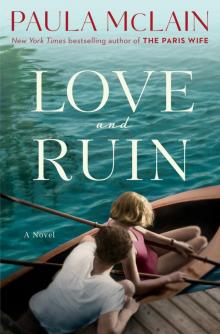 Love and Ruin
Love and Ruin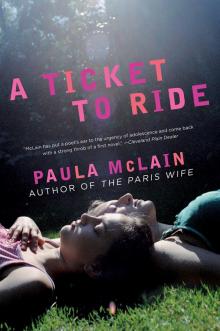 A Ticket to Ride
A Ticket to Ride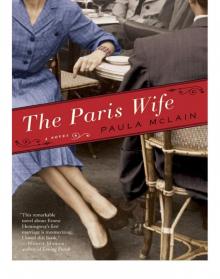 The Paris Wife
The Paris Wife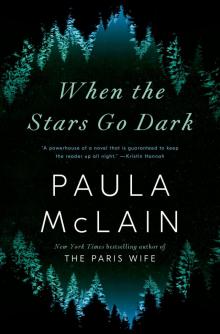 When the Stars Go Dark: A Novel
When the Stars Go Dark: A Novel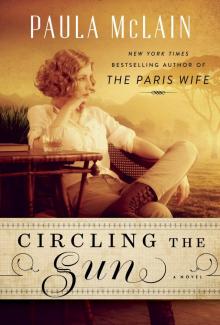 Circling the Sun
Circling the Sun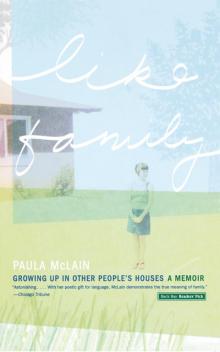 Like Family
Like Family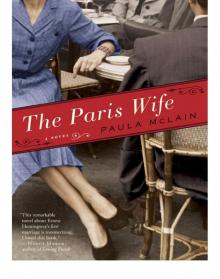 The Paris Wife: A Novel
The Paris Wife: A Novel